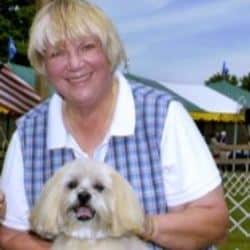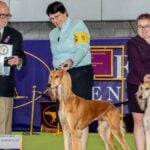


Home » A Title at Both Ends
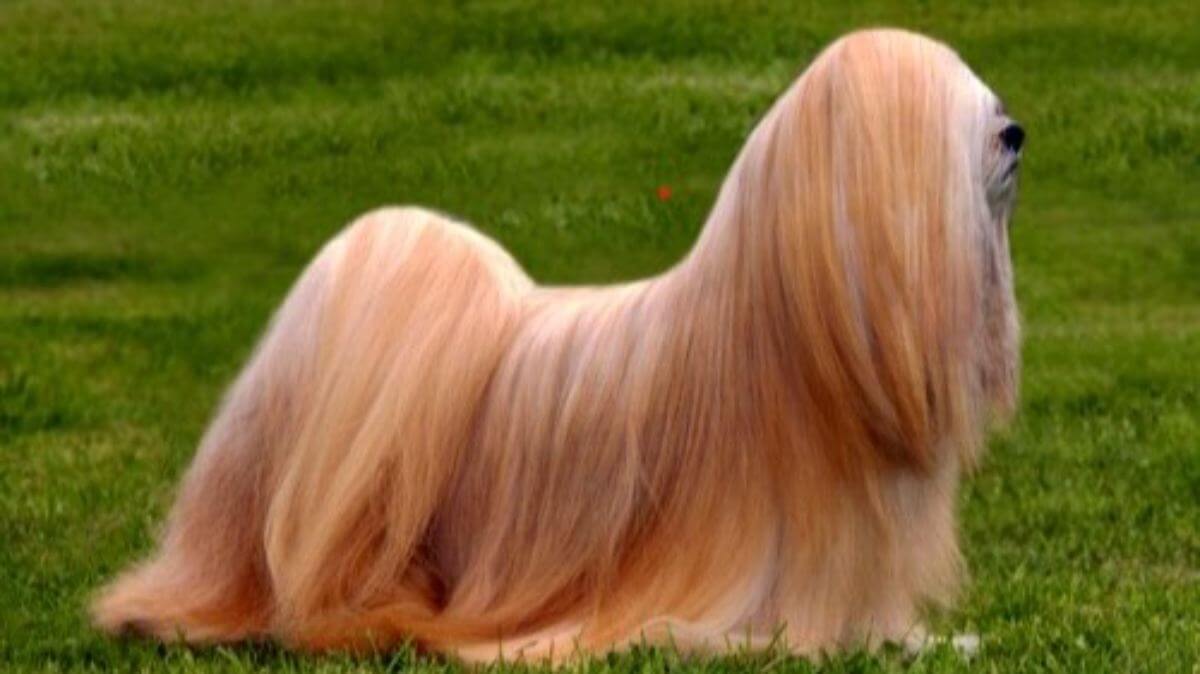
This article was originally published in Showsight Magazine, March 2014 issue.
Here is a saying that a balanced dog has a title at both ends. This is true for many people who finish a Champion and then say, “What am I going to do now?” Well, there are many possibilities. Deciding which sport you would like and, most importantly, what your dog would like, could take some experimentation, especially if you are committed to training a Tibetan breed. In the early 70s, I trained my first Lhasa Apso, Bo-Jangles, to compete in AKC obedience. He was not a conformation dog, but he was from the first litter I had ever bred and I wanted him to be a part of Lhasa history. We trained with the Poodle Club of Greater New York and there were days when I thought we would never make it as the Poodles learned so quickly and my Lhasa was only going to learn at his speed. Methods of training were a bit harsh and we were taught to do leash pops, ear pinches, and rough corrections if the need arose. At that point, I had no idea about training and really knew nothing about the Lhasa Apso.
I think Bo-Jangles got his CD just to please me because he had no joy in his performances but we were devoted to each other. At this point, I had my first show dog and had bred her and my interest turned to conformation. Fast-forward 40 years, many Champions later, 2 knee replacements, serious spinal surgery and I am now older… much older. I was retired and I had one dog, Aleck, who won the Best in Show at the National Specialty in 2001 and we were just sitting at home looking at each other. I got to thinking; since I really can’t handle in the show ring anymore maybe Obedience is the way to go. There was a very good obedience school in my area, so I signed up for some classes. Aleck and I walked in and we were surrounded by Goldens, Labradors, Pitbulls, nothing but big dogs and my heart sank. But we keep going and I was thrilled to be learning a new way to train a dog. The methods have changed to positive reinforcement of behaviors and soon Aleck was doing some exercises really well. So I asked my instructor if she thought Aleck would be ready to compete at our next National Specialty. Always an optimist, she said, “Of course he will and he will do very nicely.”
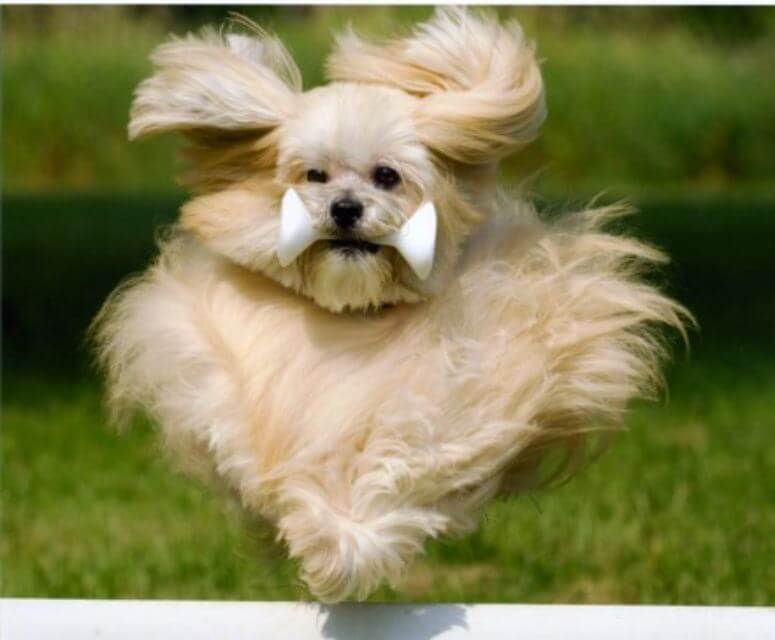
So we trained and trained but by this time I knew a great deal more about the Lhasa temperament and how they think. Lhasas like to think everything they do is their idea, and as a trainer, you must find ways to convince them that it is more fun to do it your way. They won’t repeat things over and over. Their thought is “I did it last week why do I have to do it again?” But Aleck did do it my way most of the time and he accomplished so much in his short career. He was High in Trial twice at the National Specialty making him the only Lhasa in the history of the breed to win both Best in Show and High in Trial at a National. He got his CDX when he was 10 ½ and was 3 legs short of his Rally RAE title when he died. He also had titles in other venues and had acquired over 20 titles in his lifetime. There are many choices for competition in performance with your dogs. There is Agility, Obedience, Rally, Nosework, and Therapy work. I think anyone who has ever owned a Lhasa knows how empathetic they are when you are feeling low or just not having a good day. Some of them make wonderful therapy dogs. The AKC is now giving a Therapy Dog title for dogs that have accumulated 50 hours of therapy work and many Lhasas are holders of this title. Becky Hughes is a Lhasa Breeder who has been very successful in breeding and training champions and obedience-titled dogs and holds an ALAC Register of Merit in Conformation, Obedience and Rally. She was told “you cannot do obedience with Apsos, especially if you want to do conformation too.”
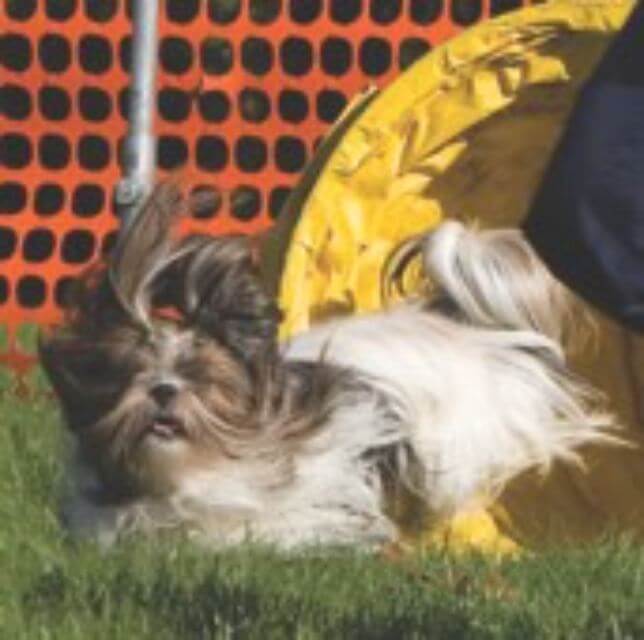
Well, she proved them wrong with her bitch, Ch. OB-One’s Ky-Ann Pepper, UD, RE, ROM who was one of her top producers and a top Obedience competitor also. One of her other dogs “Chopper” Can/U CD Am/Can/Int Ch. OB-One’s Harley Davidson, CDX, RE, was the first and only Lhasa to win both High in Trials in Obedience and also receive a Select award in Conformation at the same National in 2001. She says, “Training for both the obedience ring and the conformataion ring is not complicated and these dogs are really smart. You just have to make it fun and let them figure out there are rewards for doing things the right way.” The next venue that the AKC offered titles in was Agility. This sport caught on like wildfire. And this sport was ready-made for Lhasa Apsos, Tibetan Spaniels, and Tibetan Terriers. These breeds all are similar in their training attitudes but they grow to love this sport. In 2011 there were 6 Lhasas that qualified to go to Eukanuba Invitational in Florida and I had the pleasure of watching these little dynamos strut their stuff. They had a ball flying around the course, ears and tail flying in the wind they created as they sped from jump to jump. Melissa Torgerson who owns and trains one of 2 MACH titled Lhasas writes: “Josie (GCH MACH3 Indian Hill MeLou’s Josie RA MXS MJC XF) and I started Agility competition in 2009. She has turned out to be an exceptional agility partner.
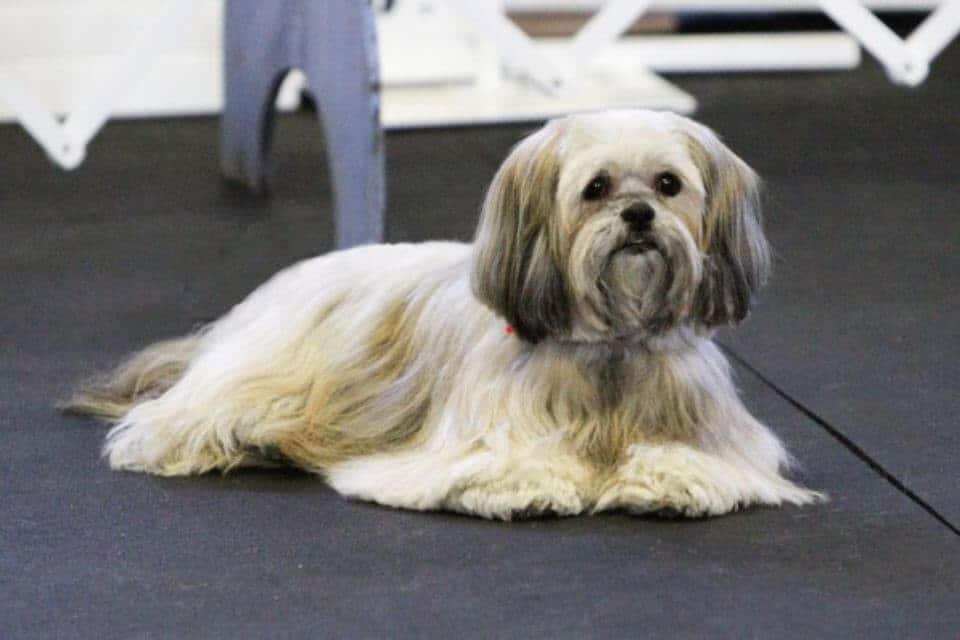
Josie is currently competing at the highest levels in AKC Agility (Excellent B) and also competed in Rally earning her Rally Advanced title. Training Josie and my other Lhasa Apsos for Agility and Rally has been a learning experience. I have learned to be patient, not to rush the learning process, not to drill and limit repetitions and to just have fun with my dog. My dogs really respond to positive motivation, really want to be right and any harsh or negative corrections will worry them and end up being counterproductive. I try to make training time fun and motivational, limiting it to 10-15 minutes and not to push for “just once more.” Josie has qualified for the 2010, 2011, 2012 and 2013 AKC Agility Invitational held in December of each year. The 2011 AKC Invitational in Orlando, FL was exceptional. Josie had matured, our partnership had solidified and she competed like a pro. She not only ran four clean runs, she ended up in sixth place cumulatively, again earning a spot in the finals. Wow! Even more exciting we ended up in 3rd place missing 2nd by .58 of a second!! We sure didn’t need a plane to fly home to Minnesota.” Saving the best for last, at least in my opinion, Rally is the newest competitive sport in which to title.
Like Agility, you have a course to follow and the best part is that you can talk to your dog, praise your dog and I must say that Lhasas really do respond to all that praise. Marsha Susag is another breeder who enjoys both conformation and performance. She produces champions that compete in agility and rally and gain titles that are beyond the basic. Marsha writes: “The Lhasa Apso is an exciting breed to work with, you must be smarter than the dog and think outside the box with each and every one of them…at least in my experience. I have not had good success in the competitive obedience ring and I believe that is because I am not enjoying the training as much as I enjoy rally and agility. Because of my attitude, I would say that my training methods are not as consistent as they need to be in order to get good obedience performances out of my dogs.
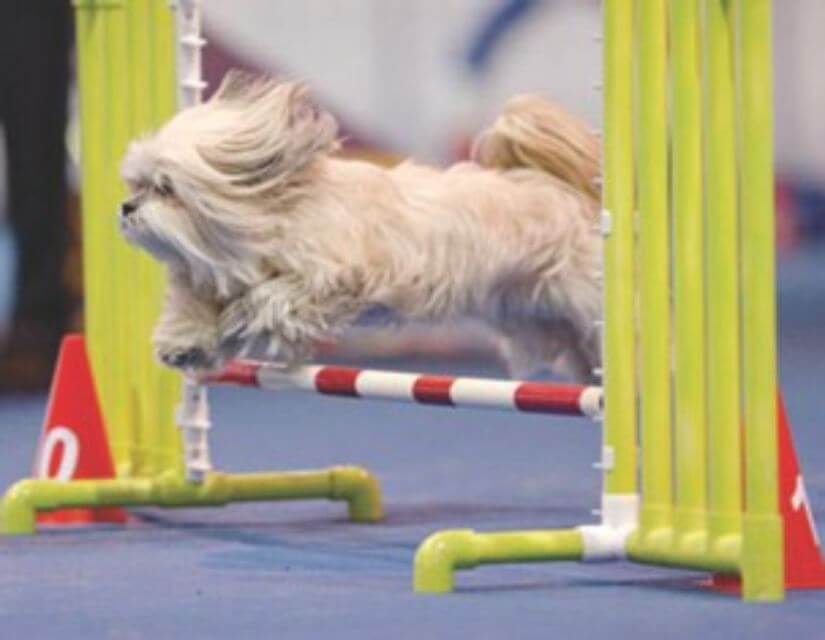
Rally is fun for me because I can talk to my dogs. Those of you who know me will get that statement! I talk to my dogs in the conformation ring and when we start training for the companion events, they are used to me giving them verbal encouragement, letting them know that they are doing what I am asking them to do. Training has helped strengthen the bond and relationship between my dogs and myself. I’m forever grateful for this opportunity to work with this fantastic, versatile breed.
